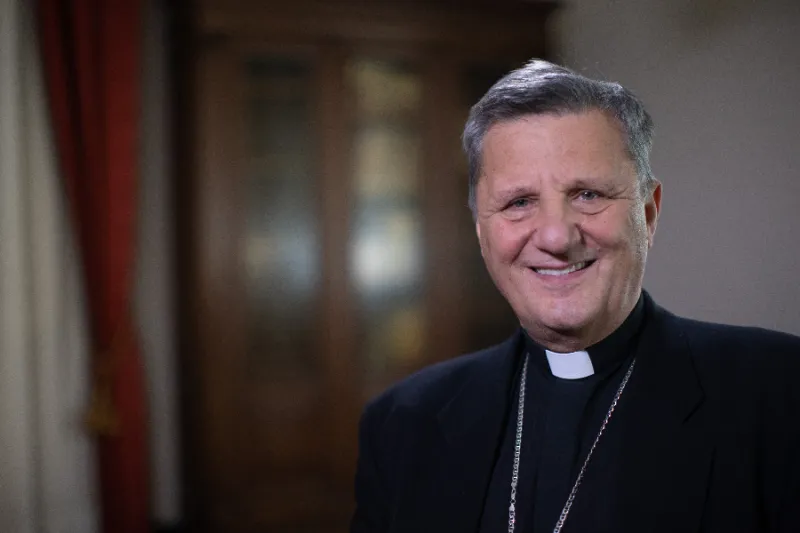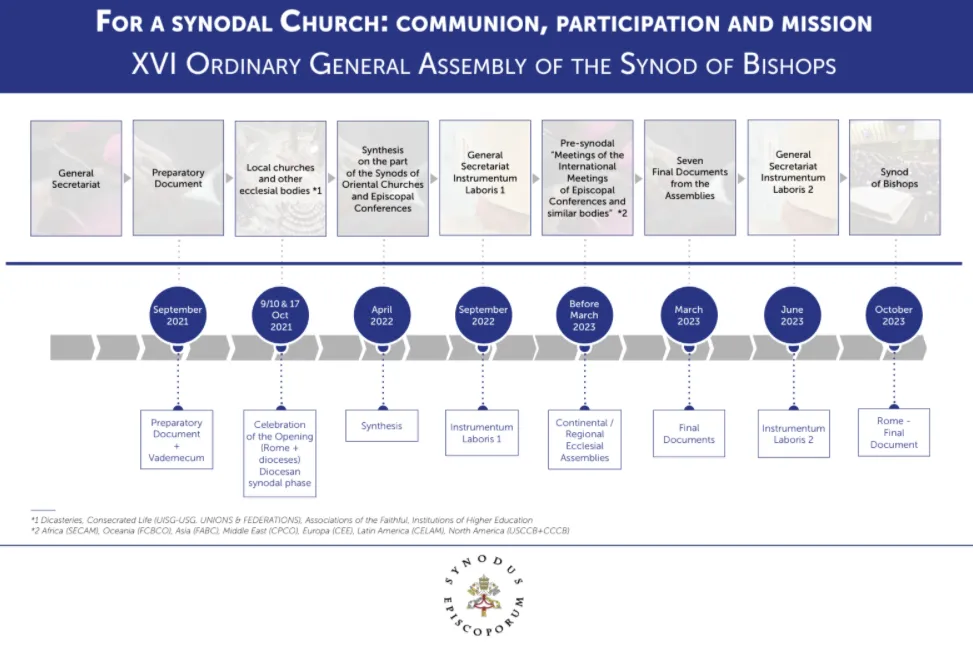
Vatican City, Mar 2, 2022 / 05:10 am (CNA).
A Vatican cardinal has said that the Synod on Synodality is a process of discernment, not a sociological survey.
“This synodal process is not sociological analysis of the Church, but it is a discernment process. And when we say discernment, that means that we are trying to listen to the Holy Spirit,” Cardinal Mario Grech told CNA.
In October 2021, the Catholic Church began the first phase of a global two-year synodal process culminating in a meeting of the Synod of Bishops in Rome in 2023.
Grech, the Secretary General of the Synod of Bishops, is the meeting’s chief organizer.
The Maltese cardinal said that the question that the Synod on Synodality was trying to answer is “what is the type of Church that the Holy Spirit is enlightening us to have for today?”
“By presenting this, these themes, to the people of God, we hope that we can help them to engage in this discernment process in a prayerful attitude,” he said in an interview conducted on Feb. 17.
“Because after all, this is not an exchange of opinions — I say mine and you say yours — but together as a community, we try to do this personal discernment and this ecclesial discernment that is listening to the Holy Spirit together.”
The Synod on Synodality is currently in the diocesan phase, when each bishop is asked to undertake a consultation process with his local Church and send the conclusions to the Vatican by Aug. 15.
A second, continental phase will take place from September 2022 to March 2023, ahead of the XVI Ordinary General Assembly of the Synod of Bishops at the Vatican in October 2023.

Grech told CNA that one of the greatest challenges was understanding “what synodality really implies.”
“Though it is a constitutional element of the Church, unfortunately we still have difficulty to figure out now what synodality means, how we can really walk together, how we can really create space for all the baptized so that we can be one Church. I think, yes, this is one of the difficulties that we are encountering,” the 65-year-old cardinal said.
Grech added that the meaning of synodality was becoming more clear as time went on and that people were becoming more engaged and interested in the synodal process.
“Obviously, as I have already hinted, this is a spiritual exercise, a spiritual experience. So I think one of the important dimensions of this process is that we kneel down and we open our ears to the Word of God,” he said. “Otherwise, I’m afraid that we will transform this profoundly ecclesial experience into a worldly experience, and this is not good.”
The theme of the 2023 Rome assembly is “For a Synodal Church: Communion, Participation, and Mission.”
Grech explained that there are different kinds of “synods” in the Catholic Church.
“For example, Church councils are synods, and the Church councils brought about an evolution in doctrine, but if we say for example, diocesan synod, or a national synod, those are different experiences of a synodal Church,” he said.
He described the “Synodal Way” in Germany as a “synodal experience on a national level,” together with the Plenary Council in Australia and the national synods being prepared in Ireland and Italy.
“Synodality is considered an important dimension of the Church, and so every Church, even a local, a particular Church is encouraged to assume this synodal style. Yet every synod has its own level of importance,” he said.
Grech explained that his office at the Vatican was available to help and accompany Church leaders in different countries in their “synodal experience.”
Even the present Synod of Bishops, he said, “has no power to change any doctrine. The synod obviously can go more in depth, about the truth, our tenets of faith. But then as Episcopalis communio says, it’s up to the Holy Father to make the final decision. He is Peter for the Church. And we have this trust in him. Through the synod, bishops, Peter, listening to all the people of God, obviously, we’ll get more help, more assistance to help us to find truth.”
Grech was bishop of Gozo from 2005 until his appointment to the Synod of Bishops in 2020.
The Vatican has announced that Pope Francis will visit Malta on April 2-3, after his trip to the archipelago was postponed in 2020 due to the COVID-19 pandemic.
Grech told CNA he was happy that the papal trip to his country would finally take place.
“There’s still enthusiasm” about Pope Francis’ visit, he said, “and people are waiting to welcome the pope because not only culturally, but the roots of our nation are Christian, Catholic.”
“So we were we are blessed to have this confirmation from Peter with his visit. And I hope that the Holy Father will help us to encounter Jesus now, proclaiming the joy of the Gospel,” he said.
If you value the news and views Catholic World Report provides, please consider donating to support our efforts. Your contribution will help us continue to make CWR available to all readers worldwide for free, without a subscription. Thank you for your generosity!
Click here for more information on donating to CWR. Click here to sign up for our newsletter.




Cardinal Grech reports that the Synod on Synodality is “not a sociological survey,” clarifying that instead, this is an “ecclesial discernment.” So far, so good.
But then he confers legitimacy on the German “synodal way” as a “synodal experience on a national level”—even after Germania rejected a two-level approach respectful of the apostolic succession in matters of faith and morals. Germania excludes itself as a real synod…
So, which is it? Either a universal but multifaceted Church, or a de facto federation of national plebiscite [c]hurches? Or perhaps the former, but adulterated by uncontested stowaways onboard the Barque of Peter?
The multi-continental synodal collage is “aggregated” and “combined” totally from below and (also from the Vademecum) even includes “minority reports.” The cardinal appeals to Episcopalis Communio—where Article 18, regarding the finality of papal action—declines to address the meaning if the Holy Father simply opts for silence?
So, at the end, possibly, silence? What then? Instead of “cafeteria Catholics,” do we now have “continental-breakfast Catholics?” Far beyond 2023 do we have the “unending journey” of unresolved contradictions? Even, “the smoke of Satan?” The field-hospital Church becomes a circus tent.
Our confidence that this outcome is not possible is shattered by advance signaling, already, from the relator-general Archbishop Hollerich in his well-timed public pronouncements (grooming?) regarding openness to the homosexual lifestyle and to (invalid) female ordinations, etc.
The Synod on Synodality—with such invertebrate leadership, Quo Vadis?
“Ecclesial discernment that is listening to the Holy Spirit together”(Cardinal Grech). Grech’s explanation of the Synodal process as a larger exercise of the entire Church on different levels of magisterial authority, pastor, bishop, metropolitan, Pope Francis with final say. Adding that doctrine cannot be changed as assurance.
As such there’s potential for great good, or for serious compromise of the faith. On all levels particularly the parish there are many pastors who have their own interpretations of perennial doctrine. What is, or not submitted
is one of these potentials for serious compromise. Added to this detriment is the widespread controversial interpretation of the Deposit of Faith as articulated Ch 8 Amoris Laetitia of which Cardinal Grech and the Church in Malta are considered a vanguard of progressivism.
Although the German Way has been criticized by the Vatican it hasn’t been sanctioned. And as such appears a foil for advancing evolution [as worded by Grech] of particular doctrine, for example, relator Cardinal Hollerich on adult homosexual relations. Perhaps a wider spectrum of availability of the holy eucharist. As within any military styled body it’s the commander in chief who will determine success.
Responding to title only – Synod on Synodality ‘is not sociological analysis of the Church’ – could have fooled me.